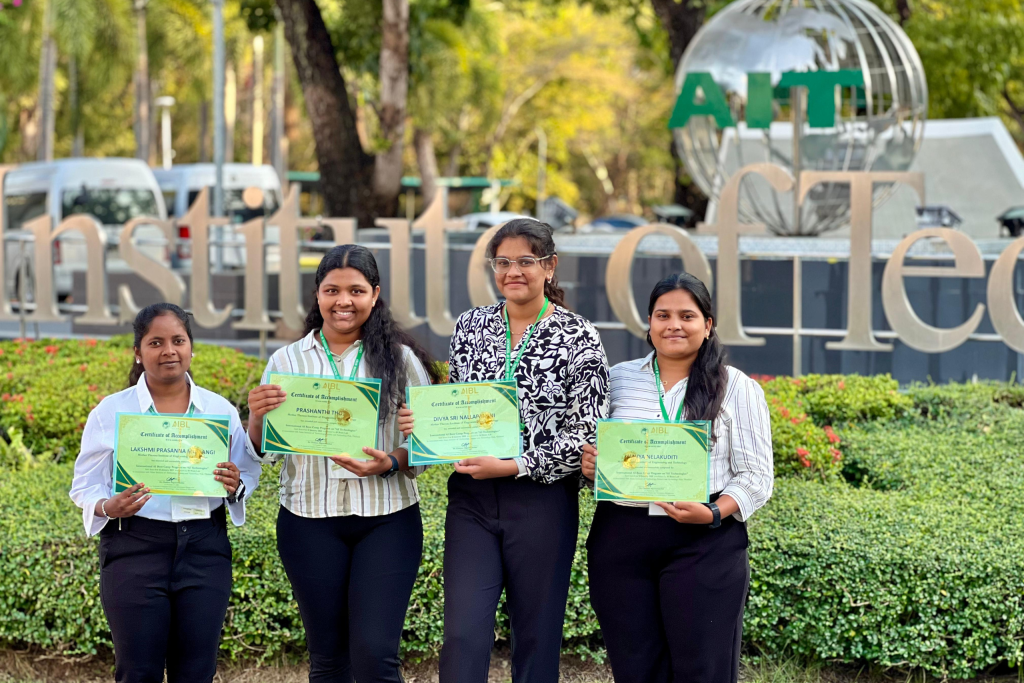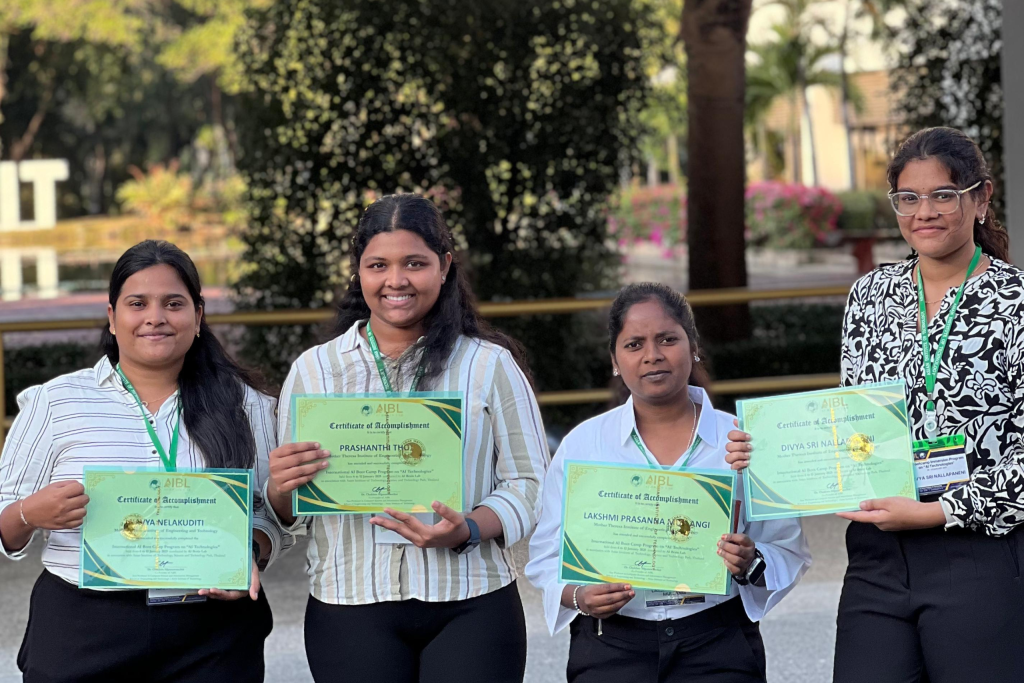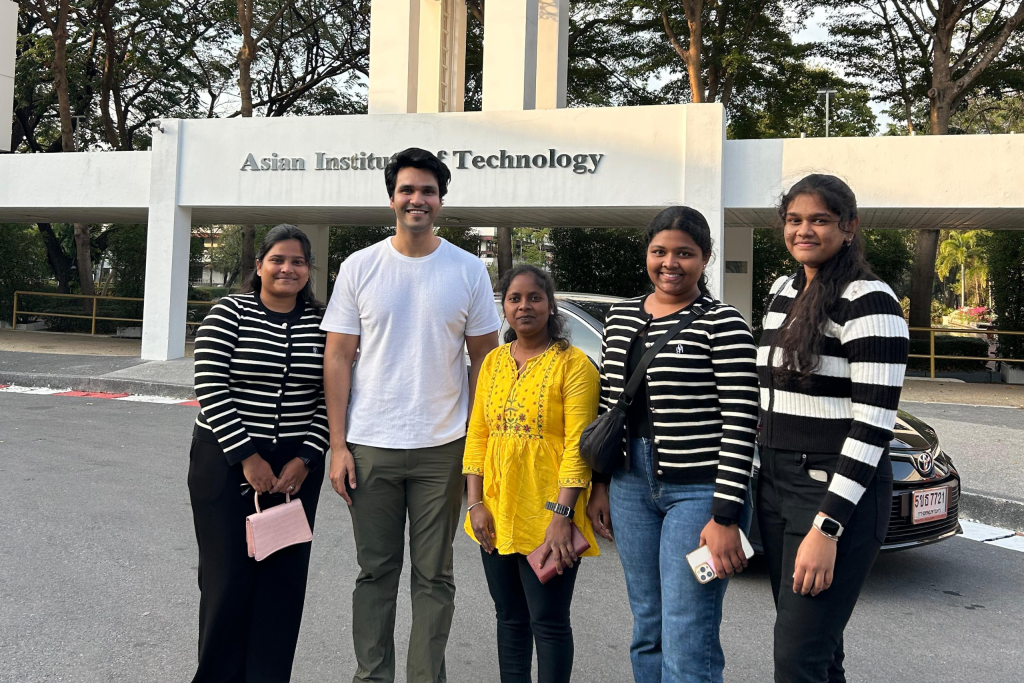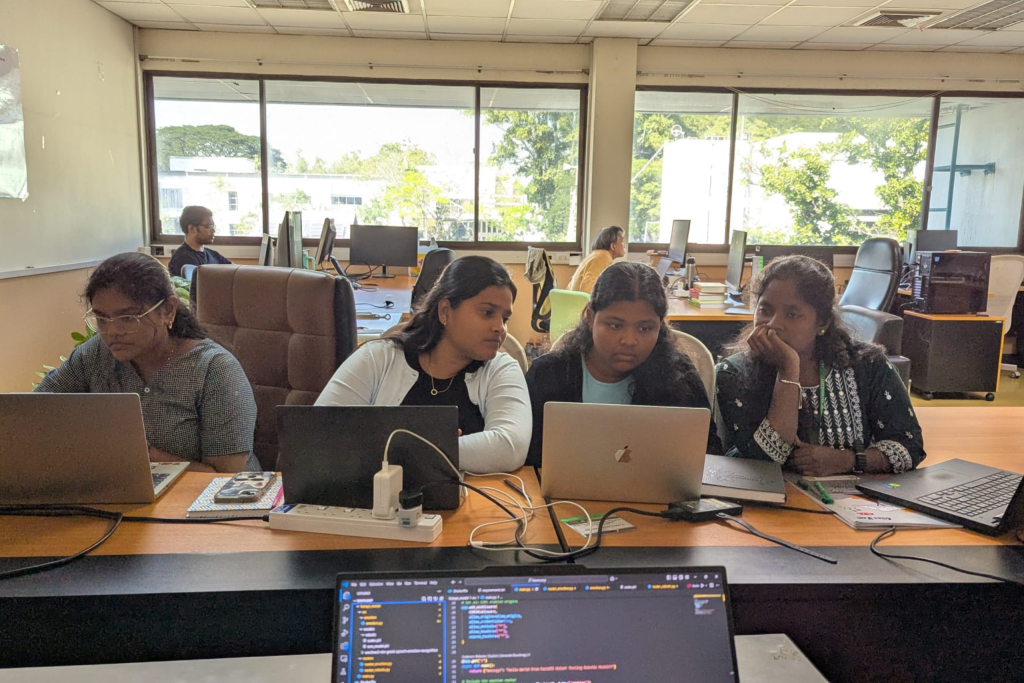AIT Thailand Global Immersion Programme
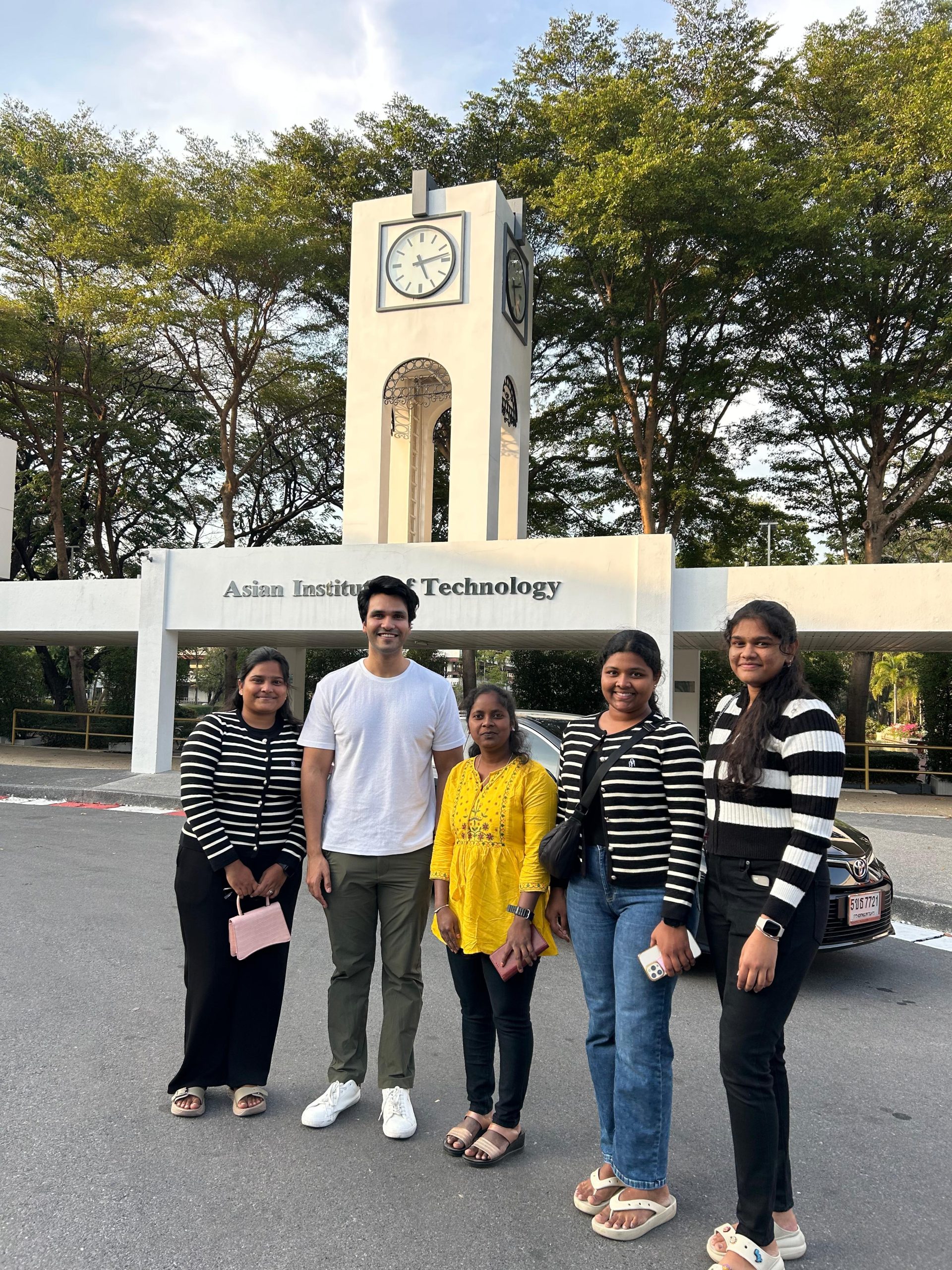 The International AI Boot Camp, organised by AI Brain Lab in collaboration with AIT, took place in Thailand from January 6 to January 12, 2025. This immersive programme offered a unique blend of AI exploration and cultural exposure, allowing participants to engage with cutting-edge AI applications while experiencing Thailand’s rich heritage. Three students from the Department of Computer Science and Engineering (CSE) participated in the AIT Thailand Global Immersion Programme, gaining valuable insights and hands-on experience.
The International AI Boot Camp, organised by AI Brain Lab in collaboration with AIT, took place in Thailand from January 6 to January 12, 2025. This immersive programme offered a unique blend of AI exploration and cultural exposure, allowing participants to engage with cutting-edge AI applications while experiencing Thailand’s rich heritage. Three students from the Department of Computer Science and Engineering (CSE) participated in the AIT Thailand Global Immersion Programme, gaining valuable insights and hands-on experience.
Over the course of a week the boot camp offered a strong methodological foundation, fostering both technical expertise and personal growth. Beyond AI, it provided valuable exposure to international collaboration, cultural immersion, innovation, and personal development, making it a truly transformative experience.
The International AI Boot Camp was thoughtfully designed to bridge the gap between theoretical AI concepts and their practical applications across various industries. Each day was packed with insightful presentations from industry experts and hands-on laboratory sessions, where participants applied cutting-edge AI methodologies to solve real-world challenges.
The journey began with an introduction and orientation at AIT. Stepping onto the beautiful, well-equipped AIT campus, surrounded by lush greenery and a diverse, multicultural community, was truly inspiring. The environment fostered collaborative learning and innovation, setting the perfect stage for the programme.
Additionally, a brief introduction to Thai culture enriched the experience, offering a glimpse into Thailand’s warm hospitality and rich traditions, further enhancing the immersion.
Key Leanings and Sessions: The programme focused on AI applications across multiple industries, including recruitment, insurance, ESG analytics, and healthcare. Each topic was introduced through theoretical discussions, followed by hands-on practical demonstrations, providing a solid foundation in the transformative potential of AI.
1. AI in Recruitment – The AI Interviewer – The session began with an exploration of how AI is revolutionising the interview process, making it fully automated and enhancing candidate evaluation through AI-driven analysis.
The practical session saw the development of a Python-based endpoint to manage interview data, incorporating voice-to-text conversion using libraries like Speech Recognition. This exercise highlighted how AI-powered hiring solutions improve accuracy and efficiency, increasing the likelihood of selecting the right candidates.
2. AI in Insurance – Intelligent CRM Solutions: Using Lang Chain, the role of AI-driven Customer Relationship Management (CRM) in the insurance industry, including prompt engineering and automation tools was explored.
During the hands-on session, designed a conversation flow and integrated claims detection algorithms, gaining valuable insights into how AI enhances customer experience and improves operational efficiency within the insurance sector.
3. ESG Studio – AI for Sustainability – This session examined the integration of Environmental, Social, and Governance (ESG) principles within businesses, with a specific focus on Thailand’s sustainability landscape.
The practical component involved building a dashboard with sample ESG data and implementing a Retrieval-Augmented Generation (RAG) algorithm using a vector database. This exercise demonstrated how AI can effectively support data-driven decision-making in sustainability and corporate governance.
4. AI in Healthcare – Ethical and Practical Innovations: The final technical session explored the ethical considerations and practical applications of AI in healthcare. Beginning with an analysis of key challenges in the sector, the session progressed to showcasing cutting-edge AI-driven innovations aimed at enhancing patient care and medical efficiency.
During the practical activity voice-based mood detection model was implemented, deepening the understanding of AI’s transformative role in mental health and diagnostics.
Cultural and Personal Experiences – Beyond academics, the boot camp provided an enriching cultural immersion. The AIT campus, with its manicured greenery, world-class facilities, and inspiring atmosphere, fostered both learning and self-reflection.
A major highlight of the programme was the Bangkok city tour, where magnificent temples, bustling shopping malls, and creative makeshift markets offering diverse products, from local delicacies to traditional crafts were explored. The seamless fusion of Thailand’s ancient heritage and modern urban landscape mirrored the essence of the boot camp—innovation built on strong foundational knowledge.
The International AI Boot Camp was a remarkable learning experience that seamlessly combined academic rigour with global exposure. This programme equipped the participants with invaluable knowledge and skills that will undoubtedly contribute to my future academic pursuits and career in artificial intelligence.
- Published in IR-News, Uncategorized
Patent on SQL Free Database Interaction
 This research paper, by Dr Ashu Abdul, Assistant Professor and research scholar Ms Surya Samantha Beri along with fourth-year student, Mr Jakkampudi Venkatasubbaiah from the Department of Computer Science and Engineering explore a framework designed to help users retrieve and analyse data without requiring any Structured Query Language (SQL) knowledge. The paper titled, “System and Method for Generating Structured Queries from Natural Language Inputs“, is particularly relevant as it enables individuals, like a car dealer seeking sales insights, to interact with their databases using everyday language. Such accessibility underscores the importance of this research in democratising data access for all users.
This research paper, by Dr Ashu Abdul, Assistant Professor and research scholar Ms Surya Samantha Beri along with fourth-year student, Mr Jakkampudi Venkatasubbaiah from the Department of Computer Science and Engineering explore a framework designed to help users retrieve and analyse data without requiring any Structured Query Language (SQL) knowledge. The paper titled, “System and Method for Generating Structured Queries from Natural Language Inputs“, is particularly relevant as it enables individuals, like a car dealer seeking sales insights, to interact with their databases using everyday language. Such accessibility underscores the importance of this research in democratising data access for all users.
Abstract:
This project is centred around creating a framework that translates user queries into SQL statements and retrieves results without requiring any SQL knowledge from the user. By delving into the workings of various RDBMS systems, with a special focus on MySQL, I developed a solid understanding of database architecture and how databases are engineered for optimized performance. This knowledge was critical in designing a system that can seamlessly interact with any given database, analyse it, and provide relevant results in response to user input.
About the Framework:
This framework is intended to convert the user queries into sql statements and attain the results from the database without intervention of sql coding. Every time writing multiple SQL commands to apply filters, commands, and extracting data is time-consuming and requires having knowledge of SQL knowledge. This project is intended to analyze a database and answer the questions that are related to a particular database without writing sql commands.
Explanation in Layperson’s Terms:
In-General we rely on programmers who are efficient in programming SQL for finding the insights from the database which are related to business or information. So, Laymen cannot access data without knowing SQL this project makes it possible. Assume, Mr. A a car dealer owns a showroom has a software dealing with his Business he wants to access his data and get insights for understanding the sales. Now he is not familiar with using SQL so he relies on someone for that or opens software and applies multiple filters to analyze his data. But What if he can use a chatbot and get solutions for all his questions from his database?
Mr.A can get conclusions from his data within no-time that thought represents this entire project.
What are the use cases of this framework to a layman?
Laymen interaction with the database for understanding their data. Reducing the requirement to understand and search for the filters in the front-end. Faster data extraction from the database. Generating the results based on user queries in natural language without sql coding. Elimination of time and efforts required for writing SQL Commands or applying filters. Understanding data gets easier for engineers as well as unknown data can be understood easily.
Practical Implementation:
This project has been successfully integrated into several existing real-time applications, enabling precise identification of data locations. By fine-tuning and enhancing our algorithms, we have achieved significant improvements in accuracy. In practical terms, users can effortlessly explore and comprehend their data.
Furthermore, extensive testing across databases of varying sizes has demonstrated the project’s ability to deliver significant and well-structured results.
Future Enhancements:
Incorporating Natural Language Processing (NLP) to process and respond to queries in users’ native languages, including speech-to-text capabilities.
Facilitating the generation of dynamic reports in various formats such as PDFs and Excel sheets.
Expanding compatibility to support additional database systems like Oracle, PostgreSQL, and NoSQL models.
Enabling data extraction and analysis from Excel sheets and CSV files.
- Published in CSE NEWS, Departmental News, News, Uncategorized
Celebrating Global Unity: International Students’ Day at SRM AP
A grand celebration was organised by the Directorate of International Relations & Higher Studies on November 24, 2024, commemorating International Students’ Day at SRM University-AP. Exciting competitions and activities set the tone for the festivities including events such as the Campus Marathon, Skipping Rope, Pushup Challenge, Relay Race, Sit-ups Challenge, Bicep Curls, and Tug of War, showcasing students’ athleticism and teamwork. Fun-filled games like Squid Game, Spin Race, Charades, and the Lemon-on-Spoon Race brought laughter and energy, while the Eating Competition and Football matches added to the vibrant pre-celebration atmosphere.
The winners of the competitions were recognised during the final celebration day, where they were awarded certificates and medals, adding a sense of pride and accomplishment to the festivities. The grand event was a spectacular showcase of global cultures and talents, featuring captivating performances, cultural showcases, and engaging activities. An array of cultural performances featured traditional African dances, Sri Lankan songs, Nepali songs, artistic performances, and a stunning ramp walk showcasing traditional outfits. The short film screening and musical acts added a creative flair, while the open mic provided a platform for participants to engage and shine.
Distinguished leaders, Director of CLM – Mr Anup Singh Suryavanshi, Director of Communications – Mr Pankaj Belwariar, and Assistant Director IR&HS – Dr Sudeshna Saha, graced the occasion with their inspiring speeches. The event highlighted the diversity and enthusiasm displayed by the students, creating an atmosphere of celebration and camaraderie. With seamless organisation and enthusiastic participation, this day reflected the spirit of global unity and cultural exchange, leaving a lasting impression on everyone present.
- Published in Uncategorized
An Insightful Lecture on Student Migration

Prof. Irudaya Rajan, Founder Chair of the International Institute of Migration and Development and Distinguished Visiting Faculty at the Department of Economics, Easwari School of Liberal Arts, engaged with faculties, scholars and students on a compelling talk on “The Future of Student Migration” on November 22, 2024. Prof. Rajan delved into the crucial role of migration in shaping and redefining national demographics and offered valuable insights into internal and international migration trends, explaining their profound impact on labour markets, education systems, and policy-making. His talk sparked engaging debates and discussions, enriching the understanding of migration as a dynamic force in demographic change and national development.
During his visit, Prof. Rajan also interacted with faculty and students, discussing collaborative research projects and sharing his expertise. The session was a thought-provoking exploration of migration’s pivotal influence on global and local contexts, leaving the audience with much to reflect upon.
- Published in Departmental News, Economics Current Happenings, Economics News, News, Uncategorized
Admission Events – 2019
For Seminar:
| S.No | Date | City | Distance |
| 1 | 27-10-2018 | Kota | 250 Kms Approx |
| 2 | 28-10-2018 | Jaipur | |
| 3 | 03-11-2018 | Kanpur | 100 Kms Approx |
| 4 | 04-11-2018 | Lucknow | |
| 5 | 08-12-2018 | Gurgaon | 40 Kms Approx |
| 6 | 09-12-2018 | Delhi | |
| 7 | 15-12-2018 | Varanasi | 300 Kms Approx |
| 8 | 16-12-2018 | Patna | |
| 9 | 22-12-2018 | Hyderabad | 300 Kms Approx |
| 10 | 23-12-2018 | Vijayawada | |
| 11 | 29-12-2018 | Chennai | 700 Kms Approx |
| 12 | 30-12-2018 | Cochin | |
| 13 | 05-01-2019 | Bhubaneswar | 450 Kms Approx |
| 14 | 06-01-2019 | Vizag | |
| 15 | 12-01-2019 | Pune | 150 Kms Approx |
| 16 | 13-01-2019 | Mumbai | |
| 17 | 19-01-2019 | Vadodara | 120 Kms Approx |
| 18 | 20-01-2019 | Ahmedabad | |
| 19 | 02-02-2019 | Jamshedpur | 300 Kms Approx |
| 20 | 03-02-2019 | Kolkata | |
| 21 | 09-02-2019 | Nagpur | 800 Kms Approx |
| 22 | 10-02-2019 | Surat |
For Webinar:
| Date | Category | Faculty Name |
| 22-10-2018 | Choosing The Right Engineering College | Dr. Priyanka |
| 05-11-2018 | Importance of Multidisciplinary Education for Engineers | Dr. Vijaysekhar |
| 14-11-2018 | Employment & Higher studies opportunities in Engineering Education | Dr. Tousif Khan |
| 23-11-2018 | The relevance of Liberal Arts in the 21st century | Dr. Shailender |
| 04-12-2018 | Skills in Demand: Preparing Students for the High Growth Jobs of the Future | |
| 14-12-2018 | How to write your next best story in the next 10 weeks “or” A step-by-step approach to creating writing and launching your ebook in the next 90 days | |
| 26-12-2018 | 5 Coolest thing you can do as a Mechanical Engineer | |
| 02-01-2019 | The Power of Peer Groups and Posses in College Success | |
| 11-01-2019 | 5 Coolest thing you can do as an Economist | |
| 22-01-2019 | B.Tech at SRM Amaravati | |
| 01-02-2019 | Liberal Arts at SRM Amaravati | |
| 12-02-2019 | Behind the scenes look at how I launch my Business | |
| 22-02-2019 | 5 Coolest thing you can do as a Computer Science Engineer | |
| 01-03-2019 | 5 mistakes to avoid while choosing your engineering college | |
| 12-03-2019 | 5 Coolest thing you can do as a Psychologist / Journalist | |
| 22-03-2019 | College and Career Readiness: Preparing Students for 21st Century Work and Life |
- Published in Uncategorized
VC Bharucha at BUSINESSWORLD’s panel discussion on “Bridging the gap between Institution and Industry”
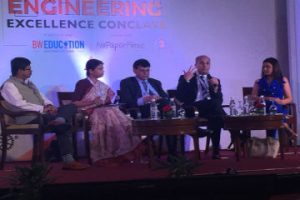 July, 2019: Jamshed Bharucha, VC of SRM AP, Amaravati was invited as a panel member in the second edition of BW Businessworld Engineering Conclave held in New Delhi. In the premise of increasing dynamism in the industry, the discussion on ” Future Skills: Are our engineers ready to adopt the global changes?” hold its own relevance.
July, 2019: Jamshed Bharucha, VC of SRM AP, Amaravati was invited as a panel member in the second edition of BW Businessworld Engineering Conclave held in New Delhi. In the premise of increasing dynamism in the industry, the discussion on ” Future Skills: Are our engineers ready to adopt the global changes?” hold its own relevance.
Bharucha expressed his concern saying, ” Most of the engineers are not working in their field. What is missing from the curriculum is skill development that would help in learning new things. We are still following a failed way of learning i.e. passive learning, where the communication is one way but in SRM, we promote active learning by involving students during the process of learning as this will facilitate the problem-solving skills”. SRM AP has active learning classrooms where regular sessions are designed with a relentless focus on improving student learning outcomes and ensuring student success in high-demand careers. Our students actively participate and engage in discussion, debates, and conversations that intrigues their interest and improves their skills. Also, for the first time in India, SRM AP introduces Collegiate Accelerator Programme presented by Minerva forum to advance the intellectual development of each student.
- Published in Uncategorized
7th August 2019: University Research Council is meeting at SRM AP Amaravati – Wednesday, August 7th 2019
The Research Council will provide the future directions for the research to be carried out by the faculty members & research scholars of SRM at Amaravati. University Research Council will be chaired by Dr. V.K. Saraswat, Hon’ble Member, NITI-AAYOG.
- Published in Uncategorized
10th and 11th August 2019: SRM AP Amaravati to host STEP (Society for Training and Employment Promotion) and Girls in Tech mentorship program
- Published in Uncategorized
Career prospects in energy storage technology
What is Energy Storage?
Ever since humans mastered energy capture, energy storage and retrieval for use at a later point of time or place has been the key pursuit in power engineering. As per Wikipedia, “Energy storage is the capture of energy produced at one time for use at a later time. A device that stores energy is generally called an accumulator or battery.”
Video Link: https://www.youtube.com/watch?v=4JGMm8qDfxw
Why is it important?
Energy comes in multiple forms, which include radiation, chemical, gravitational, electrical, temperature, and kinetic. Energy storage technology converts energy from these forms into economically storable forms that are safe and accessible.
Energy storage systems are assuming greater importance with the increasing focus on sustainable energy (solar, wind, hydro) electric vehicles and the rapid rise in use of battery-powered electronic devices like smartphones, which has led to a surge in production of lithium-ion batteries. This makes energy storage one of the most promising upcoming sectors.
Insert video: https://www.youtube.com/watch?v=ljKFr_o24jo
What are the industries involved in Energy Storage?
When one thinks of Energy Storage, one immediately thinks of batteries. However, batteries are about storage and retrieval of chemical energy, but energy is of many different types. A hydroelectric dam, stores gravitational potential energy, ice storage tanks store ice frozen by cheaper energy at night to meet peak daytime demand for cooling, and fossil fuels such as coal and gasoline store ancient energy derived from sunlight, buried and overtime and then converted into these forms. Industry applications include power storage and distribution obviously, but also automobiles, real estate, mining, and telecom.
Video Link to‘Future of Energy Storage’ https://www.youtube.com/watch?v=_LAuDTNW5dw
Video Link to ‘Beyond Batteries’: https://www.youtube.com/watch?v=3R7EzO3uBms
Who is the field relevant for?
The demand for energy storage systems is likely to grow exponentially globally as the world shifts towards renewable energy sources. This shift will mandate both grid level and unit level energy storage systems that are of viable size, cost, and energy efficiency. Significant research is currently being conducted on materials, engineering, and other optimisations.
The kind of backgrounds required for this field could include:
- Metallurgists for analysing the potential of viable materials,
- Chemical engineers and chemistry graduates,
- Electrical engineers
- Automobile engineers interested in electric vehicle development
However, energy storage is somewhat interdisciplinary, bringing together material science with expertise in energy storage using sectors.
What are the career prospects?
Estimates by Lux Research, independent research and advisory firm, suggest that the global industry for energy storage could be worth $100billion in the next few years.
Given the focus, demand, and growth, energy storage sector will generate significant jobs in the future. Moreover, due to the shortage of qualified professionals relative to demand, entry salary and salary growth prospects are positive.
Typical job roles are:
- Storage Systems Engineer
- R&D Engineer
- Reliability Engineers
- Modeling Technician
- Consultant
As per comparably.com, Energy Storage Engineer salaries average around USD110,000. Reliable estimates for India are difficult to make since it is still a niche area.
How do I get started?
The roadmap involves an undergraduate degree in electrical engineering or material sciences with a focus on specific courses in renewable energy and energy storage.
- Published in Uncategorized
- 1
- 2


